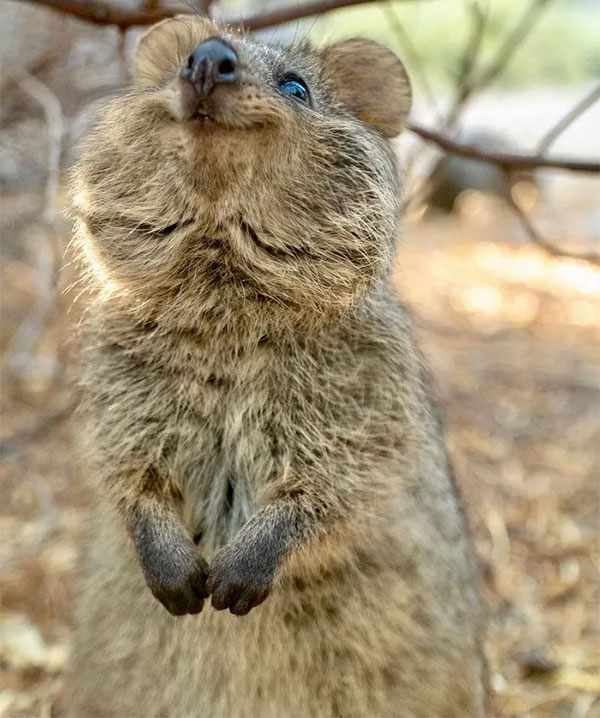Why is the 'happiest animal in the world' endangered?

Quokka - The happiest animal in the world.
In fact, spotted hyena laughter tends to be a sign of stress or aggression. Sarah Benson-Abram of Michigan State University, after a long period of observing them in their natural habitat, concluded: 'Spotted hyenas are often quite stressful. Usually they will giggle when attacked.
To infuse some positivity into this already dark world, humans are perhaps the happiest creatures in the world. People laugh, people joke, people dance, people seek company and time to enjoy their favorite pastimes wherever possible.
However, all this aside, the "happiest" animal in the world is widely recognized as a close relative of the kangaroo. Sadly, this species is currently endangered, and perhaps unusually, humans are not the only factor in that sad reality.

Quokkas are in danger of extinction.
The cutest animal in the world
The Quokka is a marsupial that lives on Rottnest Island near Perth, Australia. It has a short, coarse, gray-brown coat and has small round ears and a black nose. In addition to Rottnest Island, a small number of quokkas live inland in western Australia, as well as Bald Island, a small island in southwestern Australia.
Groups of quokkas live in territories, guarded by dominant males. They usually live in tall grass near water sources.

Quokkas usually live in tall grass near water sources.
Quokkas are herbivores that feed mainly at night, meaning they are mainly nocturnal. In addition to grass, they eat the leaves, stems and bark of many plants. If necessary, they can survive for long periods without food or water by living off fat stored in their tails.
Quokkas often dig their own water holes and can obtain water from succulent plants such as cacti, although this species can in fact live for months without drinking water, due to its ability to reuse certain substances. their waste.
Why did the cute quokka disappear?
As Britannica reports, the "quokka" is a member of the Wallaby family, a species of kangaroo native to Australia. This adorable creature, also known as the short-tailed Wallaby, has gained popularity on social media in recent years, thanks to its uncanny trait of looking like it's smiling while appearing to be posing in different ways. cutest.
The size of the quokka is quite modest, only about 53cm tall and weighs less than 5kg, according to data from the San Diego Zoo.

This adorable creature, also known as the short-tailed Wallaby
Naturally, it is this that has made "quokka" a popular partner for tourist selfies. According to Rottnest Island Wildlife, the quokka is the only native species of Rottnest Island, located in Western Australia.
Rottnest Island is home to the largest population of quokkas, and although they are the island's major draw, their large numbers and attractiveness will easily lead to human encounters. According to the report, humans should leave the nocturnal creatures alone, not feeding or approaching them, and instead observe and admire from afar.
No matter how strictly these rules of respecting quokkas are followed, the number of rare creatures is still dwindling. According to scientists, it is other animals that are to blame.

Other animals are causing quokka populations to decline.
Uncertain future for wild animals
In February 2020, EJ Scholtz and LRG DeSantis published the study 'Invasive, non-environmental, population-restricted species and geographic range of quokkas'. The study, through the Journal of Zoology, addresses the introduction of European species, such as the European goat and red fox, and how the quokka's habitat and eating habits have evolved. change how to react.
According to the study's abstract, the quokka had limited habitat in Western Australia before the arrival of invasive species from Europe, and so on.

There has been a clear change in the feeding environment of quokkas.
However, some things have changed: 'There has been a clear shift in the quokka's feeding habitat on the Australian mainland, from more sparse forests to Pleistocene shrubland, to dense forests. more and more humid. On top of that, where they do not share habitat with invasive species, their diet consists mainly of drier and tougher foods'.
The conclusion, according to the researchers, is that "the limited range of the quokka today is most likely the result of predation from classified non-native species and/or other human influences - not due to lack of suitable living environment'.
Vanderbilt University, where the researchers come from, went on to explain that many of the quokka species on Rottnest Island survived safely against foxes, which are not found there.
However, the lack of water has killed many of them on the island. Sadly, factors like these will only get worse as Earth's temperature rises.
As DeSantis said, 'We're basically playing red-and-black gambles with native species in Australia'.
- Australia - The happiest country in the world in 2014
- Why are the Danish happiest in the world?
- How happy is Vietnam in the world in 2018?
- 10 endangered species in 2012
- 10 endangered animals
- Bhutan - The happiest Buddhist country in the world
- The secret of science about the happiest people in the world
- 6 facts prove the animal world will never stop us from being surprised
- Who is the happiest human being in life?
- 5 secrets to making Danes the happiest in the world
- Beautiful photos of endangered animals
- Top 8 rare and threatened plant and animal species
 Animal 'suffering' after hibernation
Animal 'suffering' after hibernation Why do goats climb well?
Why do goats climb well? Scientists were surprised to see chimpanzees eating turtles
Scientists were surprised to see chimpanzees eating turtles Giant catfish died deadly due to drought in Thailand
Giant catfish died deadly due to drought in Thailand